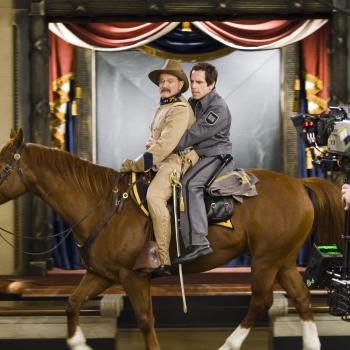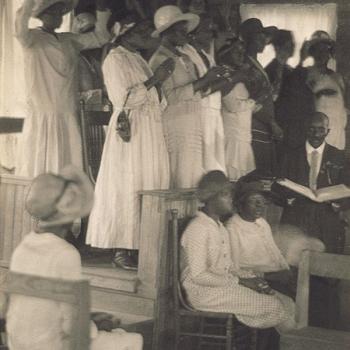Jesse Carey tries to be playful with his commentary on twelve types of jeans and what they say about the pastors who wear them. Maybe I’d find this piece funnier if I or my pastor actually wore jeans. I don’t wear them because they are either too hot in the summer or not sufficiently warm in the winter, not to mention that jeans don’t exactly communicate seriousness, maturity, or even a sense of fashion. At least they are a tad more respectable than sweatpants. Harrumph.
My pastor doesn’t wear jeans because he wears a gown on the podium and behind the pulpit. I guess he could wear jeans underneath the gown, but teaching Sunday school in jeans suggests the casual tone of a mid-week Bible study more than the sobriety of the Lord’s Day.
Here‘s one of Carey’s examples:
Overall Jeans: Your pastor does not care about what other people think if they are wearing overalls in the pulpit. In some ways, this can be a positive trait and a sign of a strong leader. But at some point, accountability from more fashionable elders should take place.
If Carey wanted to be cutting edge (which may be more than wanting to be relevant can handle), he might have considered what the consumption of tobacco says about a pastor and his or her soul:
Cigarettes correspond to the appetitive part of the soul, a fact that explains their association with both food and sex. The connection with the latter is particularly obvious: think of the proverbial postcoital cigarette, or of the ubiquity of cigarettes at singles bars. People with strong physical desires demand instant gratification, and they try to make what they desire as much a part of their own bodies as possible: hunger demands eating, thirst drinking, and lust making the body of one’s lover a part of one’s own. So too with cigarettes. A cigarette is inhaled: it must be fully and internally consumed in order to give pleasure. And a cigarette, with its quick buzz, is also instant gratification. Even the cigarette’s notorious connection to death ties it into appetites: both are indifferent to health in their quest for satisfaction, and both, when they reach addictive levels, become hostile to it.
Cigars, on the other hand, correspond to the spirited part of the soul. This explains their traditional popularity among men seeking honor or reputation—politicians, executives, etc. The reason for this correspondence can be found in the similarity between cigars and ambition. A cigar is visually impressive: with its large size and great billows of smoke, it often leaves a greater impact on the spectator than on the smoker. Further, a cigar is phallic—not with regard to male lust, but to male power. “Testis” in Latin means “witness”: the phallic status of the cigar is meant to bear public witness to the smoker’s prominence, his virility. The fact that a cigar is not inhaled reflects this external focus.
Ambition also has these traits: it too is more external than internal. Unlike physical desires, which are satisfied simply by consumption, ambition requires the consensus of others. The honor-seeker, for example, has to be honored by as many people as possible in order to be satisfied.
Finally, the pipe corresponds to the rational part of the soul, which explains why we tend to picture wise figures smoking pipes: the Oxford don surrounded by his great books, or Sherlock Holmes, who, in Doyle’s original stories, actually smoked other sorts of tobacco as well, yet is almost always portrayed with a pipe. Unlike cigars and cigarettes, a pipe endures. Similarly, the questions of the philosopher far outlast the passing concerns of physical desires on the one hand and human ambitions on the other. Further, while the cigar is entirely masculine, the pipe has both masculine and feminine elements (the stem and the bowl). This corresponds to the philosopher’s activity, which is both masculine and feminine: masculine in its pursuit of Lady Truth, feminine in its reception of anything that she discloses. Finally, the effect that the pipe has on others is analogous to the effect of philosophizing: the sweet fragrance of a pipe, like good philosophy, is a blessing to all who are near.
Thankfully, my pastor smokes a pipe. I think this is so mainly because of finances. Pipes cost “pennies a bowl” to smoke. A decent cigar will cost you $4 to $5. What’s even better is that my pastor doesn’t chew tobacco:
The use of tobacco that does not involve fire, therefore, somehow corresponds to these nonhuman—or more accurately, subhuman—parts of the soul. Chewing tobacco, for example, is a quintessentially subhuman activity. It is the rumination of bovine men. Or perhaps we should say it is camel-like, for camels not only chew, but spit as well. In either case, the point is clear: chewing tobacco is a sub-rational activity, which is why we usually associate it with men of limited acumen.
















